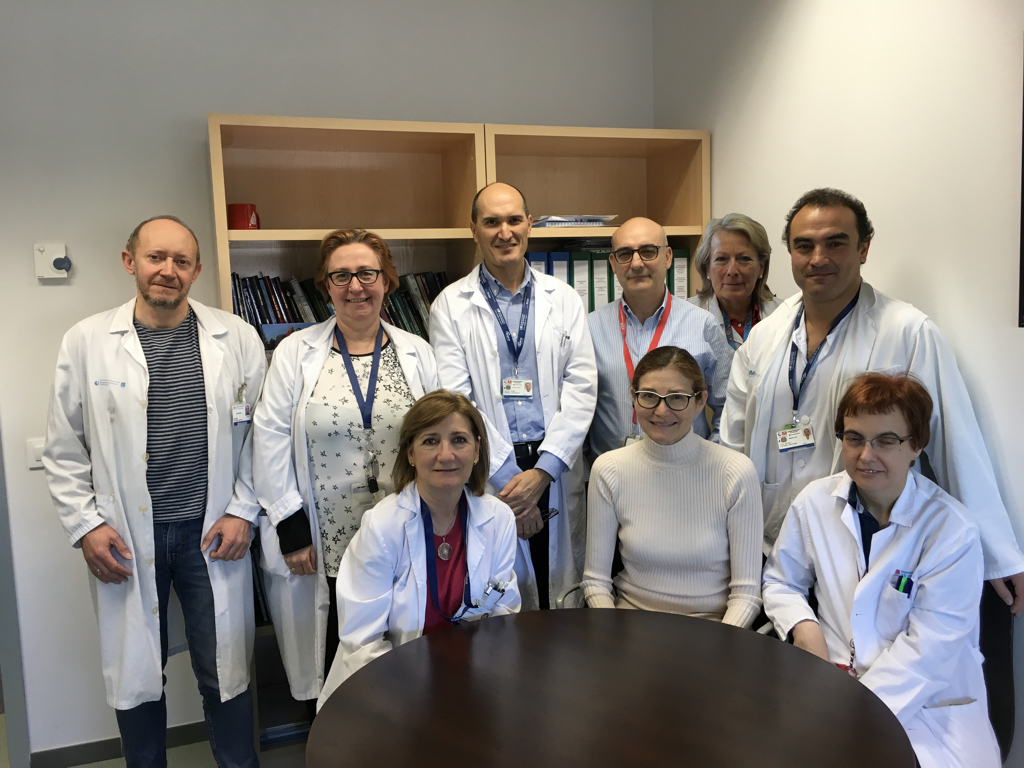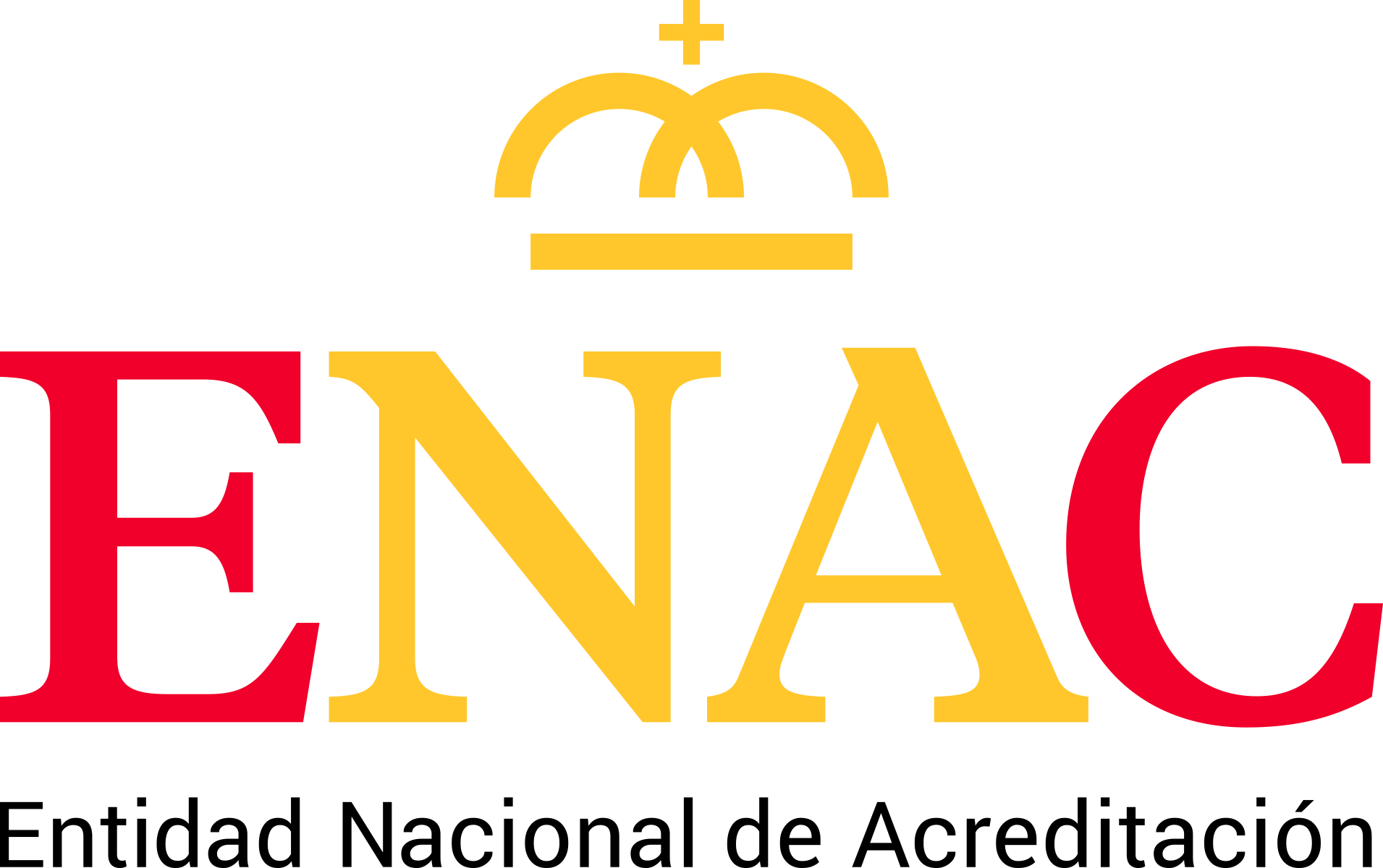12-octubre-accreditation-15189
The 12 de Octubre University Hospital makes a firm commitment to ENAC accreditation. Interview with the medical laboratory faculty team

The 12 de Octubre University Hospital has recently been granted ENAC’s accreditation for practically all activities in three key medical laboratory services: Clinical-biochemical analysis, haematology and Immunology. In addition, they have become the first hospital in Spain to be accredited for mitochondrial DNA depletion testing and of CD25soluble biomarker quantification.
Why did you decide to accredit almost all of your activities?
Dr. Laura Parés Pollán (Coordinator of laboratory Quality) responds:
The decision actually initially came from a reorganization project which the management planned in 2009 and began to run in 2010. This project envisaged a common laboratory pre-analysis area (Clinical/Biochemistry, Haematology, Immunology, Microbiology and Genetic analysis), a central laboratory (Core 24 hours) where more than 80% of the activity volume is concentrated, one coordinated information system and one commonly coordinated quality area, with the goal of continual improvement with external laboratory recognition.
In 2012, at the management's request, the Quality Area prepared a project that was put into motion in 2013. The first decision was to choose laboratory accreditation or certification. We opted for accreditation for the recognition and competitive advantage it involved, taking into account that our Hospital is highly complex, a reference centre for South Madrid, as well as for other city districts and other autonomous communities. Accrediting practically all our activities has been a major organizational effort which was put under an umbrella of common coordination, with each laboratory having a quality manager. It must be emphasized, first of all, that to achieve our goal, we have not relied on any type of external consulting. It has been a team effort.
What benefits to the service of the hospital and patients did you consider accredited services brought?
Dr. Joaquín Martínez (Head of Haematology), Dr. Rosa Ayala (in charge of quality in the Hematology service), Dr. Estela Paz (Head of de Immunology), Dr. Mª José Castro (in charge of quality in the Immunology service), Dr. Mª Pilar Díaz-Rubio (Head of Clinical/Biochemistry Analysis) and Dr. Laura Parés (in charge of quality in the Clinical/Biochemistry Analysis service) respond:
Accreditation is a guarantee of laboratory quality for both patients and clinicians. For patients, accredited services provide a level of safety that is always being improved. Our clinicians also benefit in the same way knowing that the laboratories' activities are controlled and inspected periodically, and that their decisions are based on accurate analytical results.
It must also be highlighted that at the 12 de Octubre University Hospital an important research activity was started by our Health Research Institute (i+12) accredited by the ISCIII, so having a broad accreditation scope is beneficial because that supports us, as our Institution is a reference laboratory of numerous clinical trials and biomedical research projects, as well as in the areas of molecular biochemistry, immunology, and Oncohaematology.
This accreditation makes you the first hospital accredited for mitochondrial DNA depletion testing. Could you talk about the importance of this trial, as well as the benefits that such accredited trials bring to patients?
Dr. Miguel Angel Ángel Martin Martín Casanueva and Dr. Alberto Blázquez Encinar (mitochondrial diseases and neurometabolic Laboratory Faculty) respond:
Mitochondrial diseases are a group of rare diseases with a prevalence estimated at 1:5000-10,000. They are clinically and genetically heterogeneous and can be caused by mutations in the mitochondrial DNA (mtDNA) or nuclear genes and there is practically no effective treatment. A subset of them are "mtDNA maintenance syndromes", which are characterized by presenting as brain diseases, myopathies and liver diseases, and present in diana tissues, multiple deletions and mtDNA depletion (a significant decrease of mitochondrial DNA tissue copies). The "mtDNA depletion" trial is used to quantify mitochondrial DNA copies in tissue by PCR to real time from a muscle biopsy or liver biopsy of patients with a clinical, pathological or biochemical suspicion of having these disorders, therefore, analysis according to accreditation standards is essential to ensure the result's optimal quality.
This trial enables us to more profoundly understand these diseases and contributes to identifying the responsible gene and to applying molecular treatment strategies. We would like to also indicate that our laboratory is a national reference for mitochondrial DNA depletion trials, the CSUR Hereditary Metabolic Diseases, and the imminent CSUR of Neuromuscular Diseases within the hospital.
12 de Octubre is also the first hospital accredited for CD25soluble biomarker quantification testing: How do you value the importance and benefits of this testing?
Dr. Luis M. Allende (Immunology service Faculty, cellular immunology and immuno-deficiencies Unit) responds:
The CD25soluble is an important immunology parameter for diagnosing and monitoring certain primary and secondary immuno-deficiencies and other pathologies that present immune system hyper-inflammation/deregulation. In addition, it is one of haemophagocytic syndrome’s (SHF) or hemophagocytic lymphohistiocytosis syndrome’s (HLH) diagnostic criteria. SHF gathers a series of hyper-inflammatory disorders with a very heterogeneous spectrum that can be inherited (primary SHF) or acquired (secondary SHF) in the context of infection, malignancy, auto-immune or auto-inflammatory diseases.
Previously, neither in Spain nor in other countries was there any centre accredited to quantify soluble CD25 or inter-comparison programs involving the trial.
We have been the first centre to perform this trial accreditation and therefore, we have voluntarily set up some quality specifications for the CD25soluble analytical method which has been a very useful and important task for several reasons; one of them is setting up a rigorous and robust internal quality assurance system and, indirectly, we have promoted GECLID (Program of External Quality Assurance of Diagnostic Immunology Laboratories in the Spanish Society of Immunology) including soluble CD25 quality quantification in their external program - being the first program to include it.
During 2017, 257 requests were received, 80% of which were requests from the Hospital and 20% were requests from other centres, mainly La Paz Hospital and the Niño Jesus Hospital in Madrid. With the CD25soluble quantification accreditation in the 12 de Octubre Hospital, our laboratory strengthens its position as a national reference centre for the study of this type of hyper-inflammatory pathology.
It is also the second laboratory jointly accredited in accordance with the ISO 15189 standard and Immunogenetics Federation EFI standards for transplant histocompatibility-Immunology testing: how do you value obtaining this single certificate?
Dr. Estela Paz (head of the Immunology service) and Dr. Mª José Castro (attached to the Immunology service) respond:
Our Histocompatibility and Transplant Immunology laboratory at the 12 de Octubre Hospital's Immunology Service gives assistance to all organ transplant teams, particularly kidney transplants in the hospitals: 12 de Octubre, La Paz (adult and child), San Carlos de Madrid Clinic and Virgin Virgen de la Salud de Toledo. This means that we cover approximately 80% of patients and transplants in the Madrid Community. Our laboratory's objective has always been to offer patients and transplant teams the highest quality and fast and efficient analytical coverage. In 2014, we proposed and were granted accreditation by the EFI (European Federation of Immunogenetics) for donor-recipient HLA-typing testing, anti-HLA antibody studies for patients on the transplant list, patients transplanted and cross-matching.
In 2017, at the same time as the EFI accreditation renewal, and taking advantage of the opportunity to re-evaluate ourselves, we got accredited by ENAC according to the ISO 15189. We embarked on this very exciting and time-consuming project of double accreditation. Since the Community of Madrid (CM) requires its own accreditation program for all transplant activities, which we also meet, it can be said that currently our Histocompatibility and Transplant Immunology Laboratory has three accreditations. This ensures constant review of all procedures and compliance with maximum quality standards.
The Spanish organ transplant programme, and Madrid in particular, is a world leader by having the highest donation rate, via donors in cardiac arrest or aged donors. With the EFI and ENAC accreditations according to ISO 15189 and the CM's for Histocompatibility testing we contribute to strengthen the programme's prestige and leadership in our country. The need to comply with standardized quality programs will be another sign to show the transplant professionals from South America, China or the Middle East who regularly visit our laboratory to learn the Spanish transplant model.
Accreditation News
Accreditation News is published quarterly and sent to organizations and to people who have asked to be included on its mailing list.
Would you like to receive a free copy of Accreditation News? Subscribe here.

